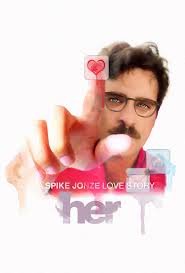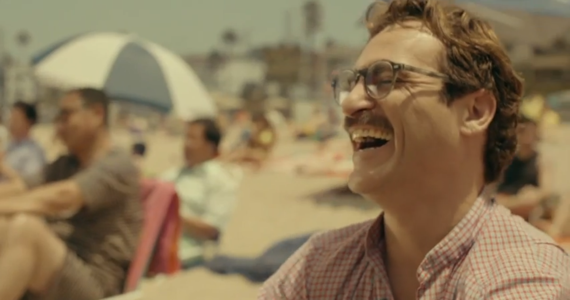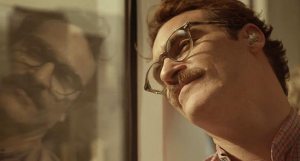 We watched the Spike Jonze film Her on Saturday night. It’s about a man named Theodore (Joaquin Phoenix) who has a romantic relationship with a computer operating system (OS). I wish I’d seen it on the big screen, in part because it was so beautiful, but also to hear other people’s reactions. As it was I watched it in my living room with two people who fell asleep…
We watched the Spike Jonze film Her on Saturday night. It’s about a man named Theodore (Joaquin Phoenix) who has a romantic relationship with a computer operating system (OS). I wish I’d seen it on the big screen, in part because it was so beautiful, but also to hear other people’s reactions. As it was I watched it in my living room with two people who fell asleep…
Along with everyone on Rotten Tomatoes, I loved the film, was fascinated by it, but unlike most of them, I also found it deeply unsettling, right from the beginning. I wanted it to be something else. I thought it wasn’t asking the right questions.
Of course, there’s really only one question all of these AI films ask: “What does it mean to be human and how close can a machine come to being human?”
That is the real question in Blade Runner, another film about the romance between man and machine. Rachael (Sean Young), the character right on the edge of humanity, perhaps even crossed over, is human because she has a story programmed into her and because she has enough experience combined with her story to have feelings.
In Her, the OS Samantha (voiced by Scarlett Johansson), starts having feelings almost immediately. But who is she? It’s just programming, and her ability to acquire from cyberspace, digesting large amounts of information and, ultimately, interacting with other people who have downloaded the same OS and then directly with other OSs. And it is posited that with her great intuition she starts feeling immediately.
It makes one wonder. Is this/she all narcissism, Theo’s desires and self reflected back to him, as one reviewer put it, yin to his yin? Also, if she’s so evolved, why the jealousy and insecurity? What’s her story? What is it that defines her otherness– and isn’t it necessary for her to have a completely separate identity for there to be a relationship at all?
The very premise is fraught with difficulty. And Jonze skirts it by just positing her and keeping things moving. And he just keeps positing. We have to accept all the things that Samantha is, and not question where “she” came from or what she’s made of. It’s not about her, in the end. We will miss her, and it’s important that we like her.
Jonze also does a great job of putting two very real and important female characters into the movie: Theodore’s ex-wife Katherine (Rooney Mara) and his friend Amy (Amy Adams). And we realize by the movie’s end that this is actually the story of Theodore’s therapy and recovery from his divorce. In the end, after the OSs have evolved so much that they abandon the humans and go off to commune purely in the realm of higher consciousness, he writes a letter not to his OS but to Katherine, accepting her as an individual and taking ownership for his part in the break-up. Then he goes up to the roof with Amy, an actual companion, who offers real comfort just by her actual, physical (non-sexual we might add) presence.
 But wait. Isn’t this a dystopic set-up? The most surprising thing about this movie is how happy it is, and ultimately that is what is unsettling. The OS evolves but never turns on its human creator. It doesn’t use its power for evil but for a “higher end.” It is ultimately benevolent, although disinterested with humans (which is odd because it is made up of the very data of human intelligence). The real man, Theodore, ends up evolving, too, and not going off to a creepy life with an OS as his closest companion but back into the world to interact with real humans. That’s so.. um… good! Maybe he’ll even buy a dining room table to replace the one I assume Katherine took when she left.
But wait. Isn’t this a dystopic set-up? The most surprising thing about this movie is how happy it is, and ultimately that is what is unsettling. The OS evolves but never turns on its human creator. It doesn’t use its power for evil but for a “higher end.” It is ultimately benevolent, although disinterested with humans (which is odd because it is made up of the very data of human intelligence). The real man, Theodore, ends up evolving, too, and not going off to a creepy life with an OS as his closest companion but back into the world to interact with real humans. That’s so.. um… good! Maybe he’ll even buy a dining room table to replace the one I assume Katherine took when she left.
But back to the technology. Isn’t it a little creepy that as a society we’ve come to this plot? To the plot where the machines are good, maybe even better than we are? Because when we lose our fear of machines, the story goes, doesn’t that mark our step too far as a race, leading to our own undoing by machines? This is no Stepford Wives or even Blade Runner.
 Ultimately, the film celebrates our new relationship with technology. We read in newspapers about people’s “relationships” with their cell phones, how they caress them and touch them. I admit, I’ve been known to run my finger along the sleek and beautiful glass of my iPad and stroke it’s beautiful metal case. The colors of Theo’s world, soft and pastel and semi-transparent, the peaceful, glowing mural in the elevator, the clean streets and beautiful, shiny bullet train– it’s all so pleasing. It’s a beautiful world. We love our progress and feel safe and happy in it. No one steals anyone’s earbud or OS, there’s no danger in the movie at all except that normal old danger of losing love and having your feelings hurt.
Ultimately, the film celebrates our new relationship with technology. We read in newspapers about people’s “relationships” with their cell phones, how they caress them and touch them. I admit, I’ve been known to run my finger along the sleek and beautiful glass of my iPad and stroke it’s beautiful metal case. The colors of Theo’s world, soft and pastel and semi-transparent, the peaceful, glowing mural in the elevator, the clean streets and beautiful, shiny bullet train– it’s all so pleasing. It’s a beautiful world. We love our progress and feel safe and happy in it. No one steals anyone’s earbud or OS, there’s no danger in the movie at all except that normal old danger of losing love and having your feelings hurt.
And that’s what should make us unsettled. As the same reviewer pointed out, there are no children in this movie, and no discussion of them. In fact, there are no parents or siblings, no families at all. The big challenge is finding a fulfilling sex partner, and the big dilemma is whether that can be possible in a relationship with an OS. This world values progress. Progress through technology. Progress through therapy. Progress through romance. There is no soul. There is no God. There aren’t even children. There are couples, sets of individuals evolving together and apart. Where’s the future in that?


